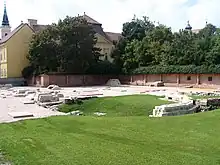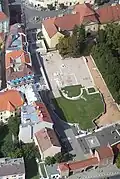| Cathedral Basilica of the Assumption of the Blessed Virgin Mary | |
|---|---|
 Ruins of the basilica | |
| Religion | |
| Affiliation | Roman Catholicism |
| Status | ruined |
| Location | |
| Location | Székesfehérvár, Hungary |
| Geographic coordinates | 47°11′30″N 18°24′39″E / 47.1917°N 18.4107°E |
The Basilica of the Assumption of the Blessed Virgin Mary (Hungarian: Nagyboldogasszony-bazilika) was a basilica in Székesfehérvár (Latin: Alba Regia), Hungary.[1] From the year 1000 until 1527, it was the site of the coronation of the Hungarian monarch. After the Ottomans occupied the city in 1543, coronations of the Hungarian monarch moved elsewhere; the building was extensively damaged in a fire in 1601. It was replaced by the Cathedral Basilica of Székesfehérvár in 1777.
Background
The Basilica of the Assumption of the Blessed Virgin Mary was built in the late 1010s by Saint Stephen I, the first King of Hungary. It was never episcopal, but it was used as the principal church of the rulers of Hungary.
The basilica was the most significant place of the Kingdom of Hungary in the Middle Ages, as it contained the crown jewels, including the throne, the Holy Crown of Hungary, the treasury and the archives. 37 kings and 39 queens were crowned in this basilica and 15 were buried in it. In 1543, the Turks occupied Székesfehérvár. The royal graves were ransacked and the basilica was used to store gunpowder, while St. Martin's Cathedral in Pozsony (today Bratislava, Slovakia) became the new coronation site.
In 1601, the building was destroyed by fire.[2][3][4] During this time, the Ottoman rule of the city was interrupted for about one year.
Its ruins were demolished and used for the construction of the new episcopal residence and for the reconstruction of another old church which in the 18th century became the cathedral of the Diocese of Szekesfehervar, erected in 1777.
In the late 1930s, St. Stephen's Mausoleum was erected behind the Basilica's ruined apse.
Burials
Thirteen kings and two queens consort were buried in Székesfehérvár Basilica.
- Stephen I
- Coloman
- Béla II
- Géza II
- Béla III, whose remains were later moved to Matthias Church, Budapest
- Agnes of Antioch, whose remains were later moved to Matthias Church, Budapest
- Ladislaus III
- Béla IV
- Charles I Robert
- Maria of Bytom
- Louis I
- Elizabeth of Bosnia, whose remains were moved to Székesfehérvár Basilica from the Church of St Chrysogonus in Zadar
- Albert
- Matthias I
- Vladislaus II
- Louis II
Family members of the kings of Hungary have also been buried in the basilica, such as Catherine, the eldest daughter and heiress presumptive of King Louis I by Elizabeth of Bosnia.
- Philip Drugeth and Pipo of Ozora are buried here as well.
Gallery
 Aerial view of the ruins
Aerial view of the ruins Merian's Theatrum Europaeum presents an almost peaceful exit (N) of the Turkish garrison out of an undestroyed Székesfehérvár after the Christian interim reconquest in 1601;
Merian's Theatrum Europaeum presents an almost peaceful exit (N) of the Turkish garrison out of an undestroyed Székesfehérvár after the Christian interim reconquest in 1601;
G = "main church" – the basílica Johan Sibmacher's "True depiction of the royal city of S., as it was reconquered by the Christians" shows the basilica destroyed and burning and some more buildings on fire.
Johan Sibmacher's "True depiction of the royal city of S., as it was reconquered by the Christians" shows the basilica destroyed and burning and some more buildings on fire.
See also
References
- ↑ "History of the Diocese of Székesfehérvár - Middle Ages". szfvar.katolikus.hu (in Hungarian).
- ↑ Historical past Archived 2014-07-15 at the Wayback Machine
- ↑ Phillips, Adrian; Scotchmer, Jo: Hungary, Bradt Travel Guides, 2010.
- ↑ Bedford, Neal; Dunford, Lisa; Fallon, Steve: Hungary, Lonely Planet, 2009.